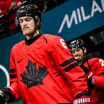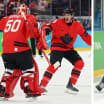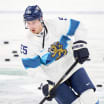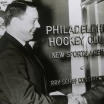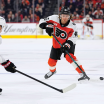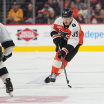It has been more than a week since the Philadelphia Flyers were badly outplayed in a Game 7 shutout loss to the New York Islanders in their Second Round playoff series. The team's performance in the final game -- after back-to-back overtime wins to take the series to the limit -- still gnaws at Flyers head coach Alain Vigneault.
"That Game 7 is very painful in the way we played, other than that first six minutes of that game. The rest of the game is definitely not what I expected,"Vigneault said on Monday during a remote media availability.
"What I'm looking forward to do from that game is to talk to the players one on one."
Vigneault said that some of the upcoming conversations -- both during the offseason and in an eventual training camp before the 2020-21 season -- may be difficult at times. However, he feels the long-term result will be a team that has a clearer understanding of the elevated level of performance needed to make a deeper run in the playoffs than battling uphill and losing in the conference semifinals.
"There are quite a few guys that I need to sit down with, need to figure out their thoughts and what they think happened because it is a moment that we can use to grow. Those moments aren't easy. They're not fun. That's definitely not a fun part of my coaching career, but it is a teachable moment. It is a growing moment for our organization and we're going to use it," Vigneault said.
Vigneault emphasized three overarching, interconnected themes that will be vital to getting to the next level.
Exit Interview: AV Dissects the Season
Flyers bench boss talks 2019-20, bubble and playoff lessons learned
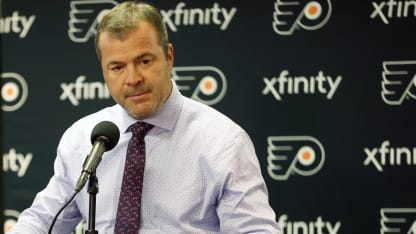
© Len Redkoles/Getty Images
1. Attention to detail is non-negotiable.
During the regular season, the Flyers ranked in the top one-third of the league in lowest team goals against average (tied for 7th at 2.77) and were ranked No. 1 in fewest shots on goal allowed per game. There were also tangible rewards at the other end of the ice.
The Flyers finished 7th in goal production during the regular season (an average 3.29 goals per game). During the round robin, the Flyers beat Boston (4-1), Washington (3-1) and Tampa Bay (4-1) by multi-goal margins. In the playoffs, however, goals became much to come by and frustration built.
Last Thursday, Flyers general manager Chuck Fletcher said a decline in the team's attention to defensive detail -- going to the right place, making sure to keep an eye on and have proper stick and body position on the opposing player each Flyer is responsible for checking , not getting three forwards (or, even worse, three forwards and a defenseman) caught up-ice -- was his biggest disappointment in the playoffs. There was also a decline in execution; far too many defensive zone shifts were prolonged due to failed exit attempts and unforced turnovers.
Vigneault agreed with this assessment, and both he and Fletcher said that the root cause of many opposition goals was offensive-minded frustration leading to cutting of corners in defensive-oriented details. Meanwhile, the volume of turnovers and long shifts in the defensive zone soon led to a lot of puck watching and stationary players, making it hard to attack with pace going north.
"The fact that we had quite a few guys that were pressing offensively led them to make low-percentage plays, which led to turnovers, which led to us not looking as fast as we can be and those turnovers led to good scoring opportunities to the opposition, which I think we did a pretty good job during the regular season staying away from," Vigneault said.
"There's no doubt that I agree with Chuck that that was part of our game because some of our guys were pressing, they weren't sticking to what works and that led to obviously great opportunities for the other team. Those are all areas that I want to talk to the team, that I want to talk to individual players about, that I'm sure we can fix in the coming future."
2. Offensive adjustments are needed against tight checking.
Even in the regular season, it is often difficult to score off the rush except when there are transitional opportunities off turnovers. This is especially true in the playoffs. Additionally, with the large-scale emphasis on shot-blocking, and sticks in the passing lanes, both the shooting lanes and passing lanes disappear in a hurry. Vigneault did not feel that his team made the proper adjustments, at least not on the execution end of players getting pucks and their bodies to the area around the net.
Mentally, the players knew what they had to do. But actually accomplishing it happened sporadically, and was never sustained for more than one period.
Additionally, Vigneault said that many of the Flyers players who are regulars on the power play allowed their frustrations with the team's playoff-long struggles on the man advantage to seep into overall drop in their offensive self-confidence and patience in making chances develop rather than trying to force plays with a low probability of resulting in anything but a loss of puck possession or a missed pass/ shot that has to be retrieved on the walls or down the ice.
"There's no doubt that offensively we didn't perform to our expectations. I think some of that had to do with execution and some of it had to do with the type of offense that you can generate and be successful during the playoffs. That's part of our learning process right now as a group, as individuals. There's certain things that you can do during the regular season that will work and in the playoffs won't. As a group, I think that's going to be a valuable experience," Vigneault said.
"Offensively also, some of our guys feed off the power play. We didn't have a lot of success on the power play during the playoffs. Their confidence was probably affected a little bit. And I think what happened to us a little bit in the playoffs is because some of the guys were pressing, they were probably cheating offensively a little bit, and that hurt us defensively also a little bit. This was obviously disappointing, but it should go in our bank of learning experiences and we should be better for it."
3. Conditioning needs change over time
Perhaps the most intriguing -- and delicate -- topic that Vigneault broached during his media availability was the topic of players' conditioning levels after the leaguewide pause; particularly as relates to some of the team's players who are now in their early 30s, including captain Claude Giroux, Jakub Voracek and James van Riemsdyk.
Vigneault did not offer many specifics, and plans to keep the upcoming discussions private. Generally, he said that while today's players look after themselves physically and pay attention to preparing their bodies for the marathon-like season and then maintaining their fitness through the season, players inevitably need to adjust aspects of their accustomed routines as they get older.
Specific to the 32-year-old Giroux, Vigneault said, "There should be no doubt in anyone's mind about his will to be successful and his will to help his teammates. I do agree that he is getting older. He's got an opportunity right now since we're in pause, the whole world is in pause, to take these next months and really work at his conditioning and probably find the time to slow time. He's getting older. As you get older, the muscles don't react as quick, but you can work on that. He's going to put in a lot of time and effort."
With the timetable currently uncertain for exactly when the 2020-21 season will start, Vigneault said that veterans and young players alike have a window of opportunity to get ready for next season.

